|
|
|
Sort Order |
|
|
|
Items / Page
|
|
|
|
|
|
|
| Srl | Item |
| 1 |
ID:
113968
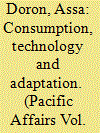

|
|
|
|
|
| Publication |
2012.
|
| Summary/Abstract |
On the edges of the digital world in India, there are millions of mobile phone users. To cater for these consumers, an economy of mobile phone care and repair has emerged in almost every town. Through the experiences of consumers and repairers, this article explores technology distribution, service practices and economic opportunity. How do they learn their trade? How do they make a living? And how do they position themselves in relation to the official branded manufacturers and licensed agents? Conceptually, the article is concerned with the nexus between consumer culture, the Indian middle class and the poor and how they engage global capitalism. It argues that middle-class ideologies and practices of consumption are both exclusive and expansive. At the same time, the poor seek to engage this economy by tapping into the unauthorized sector that responds to their demands for local participation in the global economy, while keeping them also at a certain distance from the forms and symbolic capital of the new economy.
|
|
|
|
|
|
|
|
|
|
|
|
|
|
|
|
| 2 |
ID:
112630
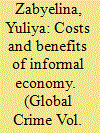

|
|
|
|
|
| Publication |
2012.
|
| Summary/Abstract |
According to IMF and OSCE reports, informal economic transactions in Russia and other states of the former Communist Bloc have cushioned the shocks of economic and political transition of the 1990s by quickly satisfying the consumer demand and providing unofficial jobs to the population faced with transition recession. As these analyses extensively emphasise the advantages of informal entrepreneurship and its positive contribution to stimulating economic growth, this article explores the phenomenon of shuttle trade - a system/form of informal trade outside state control that does not comply with state regulations - as an issue of concern for criminologists. This article investigates the convergence of shuttle trade and criminal activities and the relationship of shuttle trade to the formal regulatory environment. It offers insights into selected criminal activities at Cherkizovsky market in Moscow before its shutdown in 2009 and an evaluation of the policymaking decisions the shutdown triggered.
|
|
|
|
|
|
|
|
|
|
|
|
|
|
|
|
| 3 |
ID:
180687
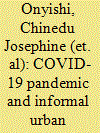

|
|
|
|
|
| Summary/Abstract |
The outbreak and spread of coronavirus disease (COVID-19) is probably the most serious global challenge since World War II. While research has paid considerable attention to the technical, epidemiological and public health aspects of the pandemic in Africa, it neglects the social, economic and political dimensions. Relying on analysis of data on trends of COVID-19 infections from the World Health Organization and Africa Centres for Disease Control and Prevention, and a rapid review of available international and national policy/programme documents on COVID-19 control responses in Africa, this study assessed the extant protocols and responses to COVID-19 in relation to urban governance principles. Utilizing the political economy framework, the social conditions of informal labour and business activities during the COVID-19 pandemic are explored with accession to social habitus of informality. The paper argues that in as much as the COVID-19 pandemic is a pervasive health problem it should be treated more as a social and political economy challenge given the large informal nature of urbanism in Africa. The study concludes that urban governance that incorporates collective organization, community groups, non-state and informal actors offers scope in the battle against COVID-19 in Africa. Rethinking African urbanism in line with the principles of the Global Campaign on Urban Governance is also canvassed.
|
|
|
|
|
|
|
|
|
|
|
|
|
|
|
|
| 4 |
ID:
153134


|
|
|
|
|
| Summary/Abstract |
The recent demonetisation in India is an issue of potentially wider relevance that requires further analysis. This brief article places the current evidence into a wider context, indicates how the process has been managed so far and then raises some searching questions concerning the role of the Indian state. Particularly, to what extent can this kind of measure be seen as evidence of responsible governance in the wider context of ‘Modinomics’, relating to claims that government should be less of a spender than an enabler? Wider elements of epistemology, asking how we know what we think we know about India’s black economy and informal sector are also gaining prominence in such endeavours.
|
|
|
|
|
|
|
|
|
|
|
|
|
|
|
|
| 5 |
ID:
083851
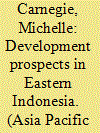

|
|
|
|
|
| Publication |
2008.
|
| Summary/Abstract |
This paper explores the effects of different representations of informal economies in Third World settings. Both the neoclassical and political economy approaches have represented the informal economy as a transient entity, and the non-capitalist practices it comprises as being remnant economic forms, or as already capitalist. Mainstream development discourse (that reflects the neoliberal paradigm) continues to ignore the value and potential of non-capitalist practices and to represent them as inconsequential to development outcomes. Meanwhile contemporary livelihood studies across the social sciences have documented the continuing vibrancy of different and hybrid economic forms in the Asia Pacific. In this paper, I use a diverse-economies approach to explore the complexities of the village economy of Oelua in Rote, in the so-called lagging region of Eastern Indonesia. Drawing on anti-essentialist Marxist theory in economic geography, I describe the multiple, locally specific and coexisting practices that comprise Oelua's diverse economy, which include distributions of surplus labour to promote social and economic well-being. I argue that recognising informal village economies as an important development resource could begin a process of building diverse development trajectories in Eastern Indonesia, complementing mainstream development proposals to attract foreign direct investment, shore up development assistance and source out-migration.
|
|
|
|
|
|
|
|
|
|
|
|
|
|
|
|
| 6 |
ID:
188188
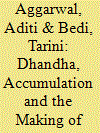

|
|
|
|
|
| Summary/Abstract |
In this paper, our main objective is to pay attention to social and material accumulations in a form of self-employed work practised by non-elites in the Indian city of Mumbai, which they call dhandha. Using ethnographic examples of two working-class, urban dhandhas—taxi-driving and vending—we suggest that thinking with the concept of dhandha and other conceptions of value and relationality that people associate with this kind of work helps us rethink and open up more abstract and universal conceptualisations of accumulation. We examine not just how much accumulation occurs but also who the various actors are in making accumulation possible; what gets accumulated and how; and why even burdensome accumulations are considered valuable and are intentionally pursued and embraced. As ethnographers who conducted our work in several of Mumbai’s many languages, we pay attention to the specific words and concepts used by our interlocutors to describe their work and their economic relations and argue that dhandha in Mumbai is not just work, it is also a way of making valuable lives and navigating the world.
|
|
|
|
|
|
|
|
|
|
|
|
|
|
|
|
| 7 |
ID:
085889
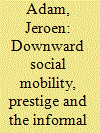

|
|
|
|
|
| Publication |
2008.
|
| Summary/Abstract |
This article illustrates how a religious conflict that started in 1999 on the island of Ambon in combination with an overall Indonesian financial crisis brought about the downward social mobility of many autochthonous Ambonese. In particular, the Ambonese employed in formal waged labour were forced to take up income generation strategies in insecure, informal economic sectors, which before the conflict had been dominated by the lower-class Muslim migrant community. This process was further encouraged by the spatial transformation during which these Muslim migrants became locked up in Muslim areas and Christian Ambonese took over their businesses in the Christian parts of the island. In a similar vein, the flight of many ethnic migrants to places outside Ambon stimulated Ambonese Muslims to penetrate these informal economic sectors in the Muslim parts of the island. As autochthonous Ambonese do not want to leave these jobs even since the violence has ended, competition at the lower-class bazaar level of the economy has vigorously intensified.
|
|
|
|
|
|
|
|
|
|
|
|
|
|
|
|
| 8 |
ID:
145716
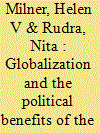

|
|
|
| 9 |
ID:
189701
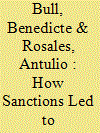

|
|
|
|
|
| Summary/Abstract |
After a deterioration of democratic conditions in Venezuela, in 2017 the United States intensified its sanctions imposed on the regime of Nicolás Maduro. The sanctions failed to topple the regime, but they accelerated the transformation of the Venezuelan economy. To counter the sanctions, Maduro carried out substantive economic policy changes, resulting in the emergence of a neo-patrimonial and authoritarian form of capitalism. In this new model, private ownership is the rule, and economic agents operate for profit. Yet there is frequent state intervention that denies individuals’ fundamental political and economic rights, and the purpose of laws and regulations is ensuring regime survival.
|
|
|
|
|
|
|
|
|
|
|
|
|
|
|
|
| 10 |
ID:
196997


|
|
|
|
|
| Summary/Abstract |
Sidewalks in the Kathmandu Valley are punctuated with vendors busy selling their merchandise to the pedestrians. Notwithstanding that street vending provides thriving opportunities for earning to the lower class, it takes a heavy toll on their health due to the relentless inhale of pernicious air. Disinterested pedestrians feel their spaces being thronged and contested by the vendors and their customers who generally take more time to make a deal through bargaining. The city police, on the other hand, treat the vendors, in many places and occasions, as the “wretched of the earth” in their routine patrols. The resistance of the vendors is complex and dynamic, and entails layered responses varying from symbolic, talking violence of the pedestrians to the batons of city police. Through interviews and observation, this research aims to shed light on the vendor negotiations, and resistance strategies vis-à-vis pedestrians, and the city police.
|
|
|
|
|
|
|
|
|
|
|
|
|
|
|
|
| 11 |
ID:
110236
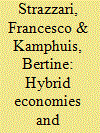

|
|
|
|
|
| Publication |
2012.
|
| Summary/Abstract |
How do informal and criminal economies transform over time, and what are the roles of armed conflict and "postconflict" intervention in this process? Based on four cases of contemporary statebuilding, this article explores the persistence and pervasiveness of extralegal economies in the face of intrusive international intervention and reflects on the implications for state formation. It observes that acting beyond the law is no prerogative of unmodern locals sitting in the antechamber of (liberally assisted) formal processes. The type of hybrid economic governance that emerges from the postconflict convergence of various levels of authority is often characterized by the selective reproduction of extralegal economic practices whose effects go well beyond the informal sector and crime boom typically registered in the immediate aftermath of violent conflicts.
|
|
|
|
|
|
|
|
|
|
|
|
|
|
|
|
| 12 |
ID:
187819
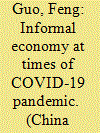

|
|
|
|
|
| Summary/Abstract |
We provide a first view of vulnerable informal economy after the blows from COVID-19, using transaction-level business data of around 80 million offline micro businesses (OMBs) owners from the largest Fintech company in China and employing machine learning method for causal inference. We find that the OMBs activities in China experienced an immediate and dramatic drop of 50% during the trough. The businesses had rebounded to around 80% of where they should be seven weeks after the COVID-19 outbreak, but had remained at this level until the end of our time window. We find a larger disruption to the OMBs in urban areas, the female merchants and the merchants who were not grown up in the places where they conducted businesses. We discuss the implications for policy support to the most vulnerable, and highlight the importance to take full advantage of digital development to follow up the informal economy.
|
|
|
|
|
|
|
|
|
|
|
|
|
|
|
|
| 13 |
ID:
185583
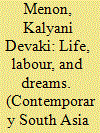

|
|
|
|
|
| Summary/Abstract |
The many Muslim women who make up India’s burgeoning informal economy, challenge any attempt to reduce them to homemakers whose lives are delimited by culture and religion. An examination of their lives reveals the complex forces that shape their worlds, and illuminates how they variously negotiate landscapes of inequality in contemporary India. Here I focus on the biography of one Muslim widow to illustrate how she labours to live and dream in contemporary India as various social forces intersect to create precarity in her life. While neoliberal priorities and a shrinking social safety-net affect underprivileged women across religious lines, the intersection of gender, class, and religion in Hindu majoritarian India has made it even more challenging for low-income Muslim women like her to make ends meet. However, dominant forces are not totalising, and the biographical method reveals how one woman negotiates precarity, employing various skills as she adapts to changing conditions, juggling multiple jobs to meet expenses, and envisioning a better future. We see not just the deep inequalities that create precarity for some, but also how dreams can be a material force in the world.
|
|
|
|
|
|
|
|
|
|
|
|
|
|
|
|
| 14 |
ID:
194104


|
|
|
|
|
| Summary/Abstract |
Monopolies constituted one of the main institutions to control the economy from the Ottoman Empire to the Republic of Turkey. Over time, monopolies’ roles changed from revenue sources for the sultans’ treasuries to assigning foreign debts to debtors, creating a Muslim-Turkish bourgeoisie, structuring property relations by commercializing the economy and finally generating revenues for modernization projects. The new Turkish state also used monopolies to raise funds for its radical modernization and state-building projects. This article examines how low-income consumers, producers and traders coped with monopolies via smuggling during the first two decades of the Republic. It argues that most of what was called smuggling were economic survival methods and the continuation of the practices that had a very long pedigree among low-income people to cope with the high prices of monopoly products due to high taxes and high monopoly profit margins. This article lays out a different interpretation of smuggling as ‘social smuggling’, which lessened the burden of the monopolies over low-income cultivators, traders and consumers. It argues that this informal economy limited the state’s extractive capacity and economic interventionism required for modernization projects.
|
|
|
|
|
|
|
|
|
|
|
|
|
|
|
|
| 15 |
ID:
123065
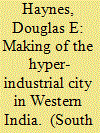

|
|
|
|
|
| Publication |
2013.
|
| Summary/Abstract |
This essay explores the rapid expansion of small handloom centres in Western India between 1930 and 1970. It attributes the transformation of these places into larger cities to the role of local weaver-capitalists, who developed new markets for local textiles and introduced significant technological innovations into the industry, and who forged strategies for combatting the growth of labour resistance. The essay also highlights the role of the late colonial and early post-Independence states, which promoted the growth of weavers' co-operatives and which imposed extensive regulations on larger enterprises. The paper argues that the powerloom centres of Western India sustained a 'hyper-industrial' quality, with limited economic or cultural diversification, restricted urban amenities and public services, and the extensive concentration of poor urban migrants in slums.
|
|
|
|
|
|
|
|
|
|
|
|
|
|
|
|
| 16 |
ID:
197428


|
|
|
|
|
| Summary/Abstract |
In this article we develop and analyse novel datasets to retrace the persistence and scale of underground market activity in Maoist China. We show that, contrary to received wisdom, Chinese citizens continued to engage in market-based transactions long after “socialist transformation” was ostensibly complete, and that this activity constituted a substantial proportion of local economic output throughout the Maoist era. This helps to explain, in part, why, when markets were officially reopened in China, private economic activity took off. We arrive at these findings through the development and analysis of novel datasets based on unconventional historical sources – namely, a collection of 2,690 cases of “speculation and profiteering” that were recovered from flea markets in eastern China. We show how these grassroots sources can be systematically analysed and used, in lieu of official statistical aggregates, to develop new insights into the macro workings of the Maoist economy.
|
|
|
|
|
|
|
|
|
|
|
|
|
|
|
|
| 17 |
ID:
152039
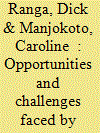

|
|
|
|
|
| Summary/Abstract |
This paper assessed the opportunities and challenges faced by women involved in informal cross-border trade (ICBT) in Mutare during a prolonged economic crisis in Zimbabwe. Sixteen women informal cross-border traders were interviewed in depth while two cross-border bus drivers and two customs officials provided key information, which was categorized and discussed along emerging themes. The women were mainly middle-aged single parents who engaged in ICBT for survival. On average, they were educated but forced into ICBT by economic hardships and lack of jobs associated with the closure of industries that started in the late 1990s. Deindustrialization, however, created opportunity for the women to obtain Zimbabwean passports and import clothes, blankets, electrical gadgets and vehicle spare parts from South Africa (SA). Hence, a delay in obtaining the passport which costs US$51 and issued within six months was the women’s first challenge. Desperate to save meager incomes as most Zimbabweans resorted to ICBT, most of them slept in the open while in SA. Local authorities harassed them searching and confiscating undeclared goods. The women’s children suffered as they missed their mothers’ attention, control and love. Instead of helping the women’s businesses flourish, government proposed banning imports to revive Zimbabwe’s industrial sector.
|
|
|
|
|
|
|
|
|
|
|
|
|
|
|
|
| 18 |
ID:
193275
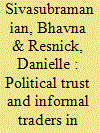

|
|
|
|
|
| Summary/Abstract |
How do cities foster political trust among informal workers? This question is particularly salient in Africa's growing cities where local governments must reconcile policy priorities across highly heterogeneous constituencies, including a burgeoning middle-class and a large informal economy. We argue that expectations about reciprocity and procedural justice shape the probability that informal traders trust their local government. In doing so, we analyse a survey of approximately 1000 informal traders in Ghana's three main cities – Accra, Kumasi and Tamale. We find that traders who paid requisite fees to local assemblies and could attribute a benefit from those payments were more likely to trust their local government while those who had experienced harassment by city authorities were less likely to do so. The paper highlights that drivers of trust among diverse urban constituencies deserve greater empirical and comparative attention, especially as countries deepen decentralisation initiatives and cities commit to development goals around inclusivity.
|
|
|
|
|
|
|
|
|
|
|
|
|
|
|
|
| 19 |
ID:
177942
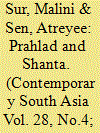

|
|
|
|
|
| Summary/Abstract |
This article explores the irreverent and supposedly irrational actions of two protagonists, Prahlad and Shanta, characters that the authors encountered during the course of their extended fieldwork in Kolkata. Prahlad is an Oriya migrant plumber who passionately seeks god at the cost of making money, and resists adhering to rational economic behaviour in the city. Shanta is a grieving mother who relentlessly seeks justice for her son’s disappearance during a revolutionary movement that consumed the majority of urban youth in the 1970s. Family, friends, neighbours and employers describe and at time dismiss rgen as pagla or insane. This article foregrounds these expressions of paglami or madness in Kolkata. We ask: how does close ethnographic attention to quotidian madness – its articulations, exploitations and resistances – enable us to rethink urban lives? We argue that dissension, alienation and ‘unreasonable fixations’ are affective thresholds of a changing city. They corroborate the ways in which the city’s transforming political landscape impinges on its ordinary lives.
|
|
|
|
|
|
|
|
|
|
|
|
|
|
|
|
| 20 |
ID:
196320


|
|
|
|
|
| Summary/Abstract |
In Kinshasa, chronic crises and lack of access to employment, quality education, and other resources contribute to the social exclusion of a growing number of disadvantaged young people. They are deprived of the possibilities of leading a decent life and alienated from both the market and legitimate authorities. Despite their social, political, and economic marginalization, many of these precarious Congolese youth have proved adept at improvising livelihoods in the informal economy and seek out ways to be agents of social change.
|
|
|
|
|
|
|
|
|
|
|
|
|
|
|
|
|
|
|
|
|